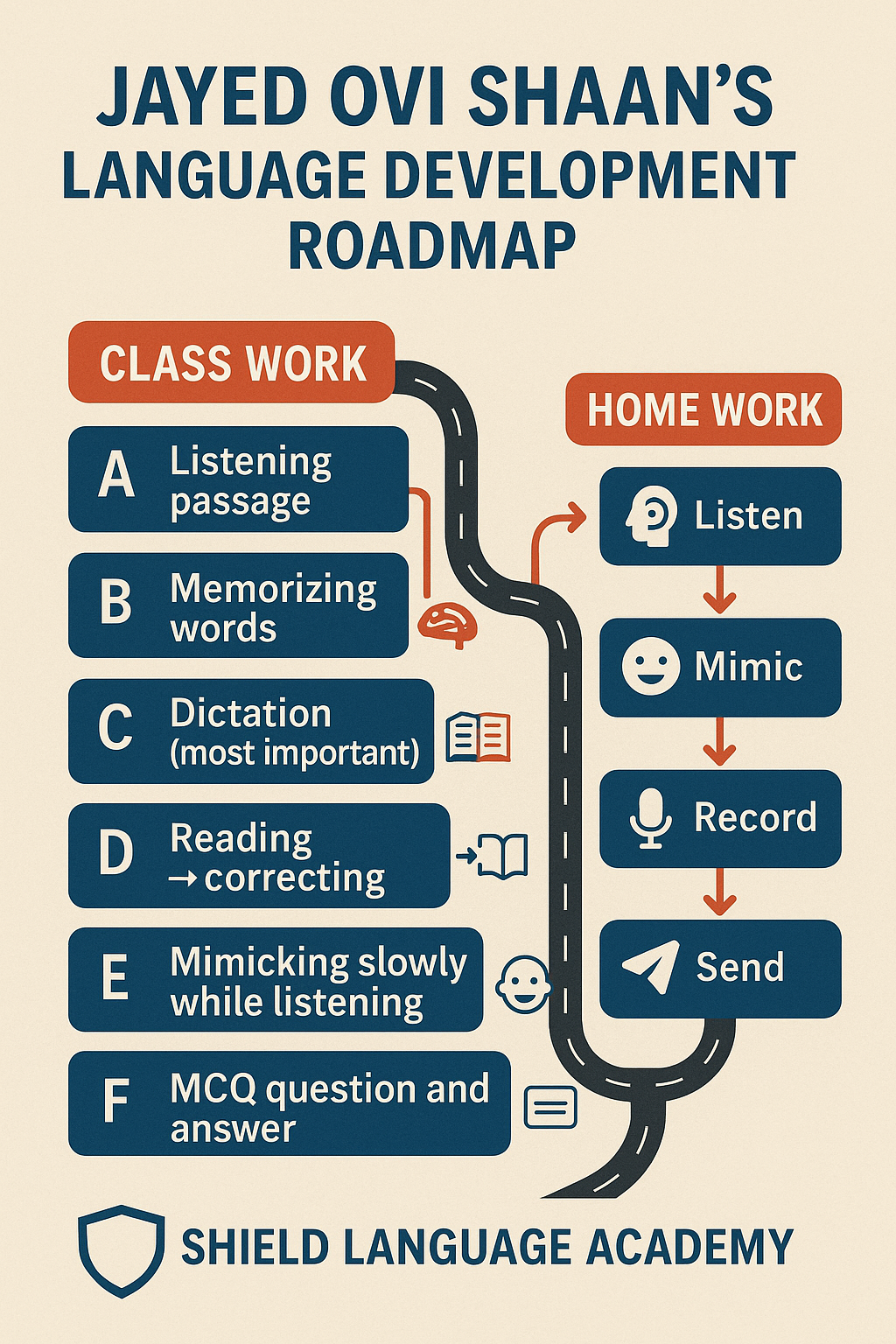🎒 Learning Journey: Grades 2 to 6
🎨 How Children Learn Languages
French Online Class
📘 Our Curriculum
While our lessons differ from traditional school subjects, they actively complement and support them. We focus on improving language proficiency while developing 21st-century skills, cultural awareness, and strong human values.
Education is not just about learning words—it’s about preparing for life. That’s why we teach in ways that help children grow into confident, capable, and resilient individuals ready for a successful future.
Grade 2
Daily dictation, basic reading, simple routines, manners.
Grade 3
Dialogues, time management, planners, spelling games.
Grade 4
Essay writing, measurement, budget roleplay, teamwork.
Grade 5
Research, storytelling projects, money management, debate.
Grade 6
Presentation, digital tools, cause-effect thinking, ethics.
Grade 2 Roadmap
🔤 Language Development
- Daily dictation of 5–7 words (simple nouns & actions)
- Short story reading aloud with moral discussion
- Basic sentence writing (3–5 words)
- Spelling games and vocabulary matching
🧠 Thinking & Life Skills
- Identifying objects by size, shape, and category
- Time of day activities using real clocks
- Using classroom money for toy shopping
- Simple if-then games and treasure hunts
🎨 Creativity & Expression
- Color-based art activities and paper folding
- Story drawing and puppet use
- Rhythm activities with claps and movement
🌱 Values & Discipline
- Listening to moral stories weekly
- Good behavior in school routine
- Cleaning and organizing personal space
Grade 3 Roadmap
📖 Language Skills
- Paragraph reading & comprehension with Q&A
- Daily dictation of 8–10 words
- Writing paragraphs with punctuation
- Dialogues and speaking tasks
🧠 Thinking & Life Skills
- Identifying road signs and simple maps
- Daily planner for homework and breaks
- Playing board games that teach planning
- Basic computer use or typing practice
🎭 Performing Arts
- Poem recitation with expression
- Emotion miming and small skits
- Drawing characters and story endings
Grade 4 Roadmap
📚 Advanced Language
- Daily dictation with punctuation and word families
- Essay writing (50–70 words)
- Reading and discussing moral fables
- Weekly vocabulary challenges
🧠 Thinking & Life Skills
- Introduction to budgeting (pocket money)
- Measuring ingredients during class cooking
- Team decision-making games
- Concept of calendars and planning field trips
🌍 Social Studies
- Map skills and national symbols
- Heroes of the country and daily duties
- Group discussions on helping others
Grade 5 Roadmap
✍️ Language & Literature
- Theme-based story writing and editing
- Reading chapters and note-making
- Phrase-based dictation and word puzzles
- Group storytelling projects
🧠 Thinking & Life Skills
- Creating and managing a small budget
- Using Excel/Google Sheets for fun math
- Personal decision trees (e.g. What to do when…)
- Digital safety and etiquette basics
🧪 Science Thinking
- Simple experiments and recording observations
- Recycling and environment awareness
- How things work (gadgets, machines)
Grade 6 Roadmap
📝 Communication & Research
- Creating small research projects with sources
- Dictation with focus on synonyms/antonyms
- Formal letter, resume, and email writing
- Speech competitions and drama writing
🧠 Thinking & Life Skills
- Real budgeting for imaginary events (e.g. birthday)
- Using apps/tools for planning (like Trello or a diary)
- Understanding consequences with cause-effect games
- Debating pros and cons of real issues
🌐 Global Awareness
- Studying one new country each month
- Community service planning (school level)
- Discussion-based current affairs activities
🎓 How Children Benefit from Our Classes
🎓 Why Learn With Us?
📚 Language Development in Children (5–8 Years)
🌟 At 5 Years
Children understand that words are made of different sounds and syllables. They can recognize words beginning with the same sound – like in “Mummy made magic marshmallows” – and play rhyming games with words like bat, cat, hat, and mat.
🔤 At 5–6 Years
Children begin to connect alphabet letters with their sounds – a key step in learning to read. They start blending sounds like t + o + p to make top. This builds phonics awareness.
📖 At 6 Years
Children start reading simple stories with easy words that sound like they’re spelled – such as pig, ball, or door. They also begin copying and writing letters, especially those linked to familiar sounds.
📚 At 8 Years
Children understand what they read and may begin reading independently for fun. Writing becomes more creative, and they’re often able to compose short, simple stories of their own.
